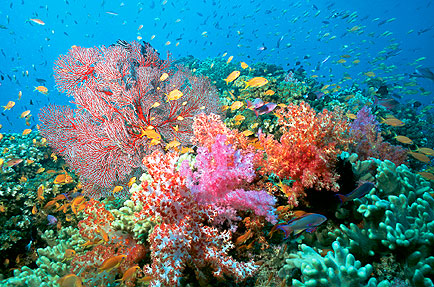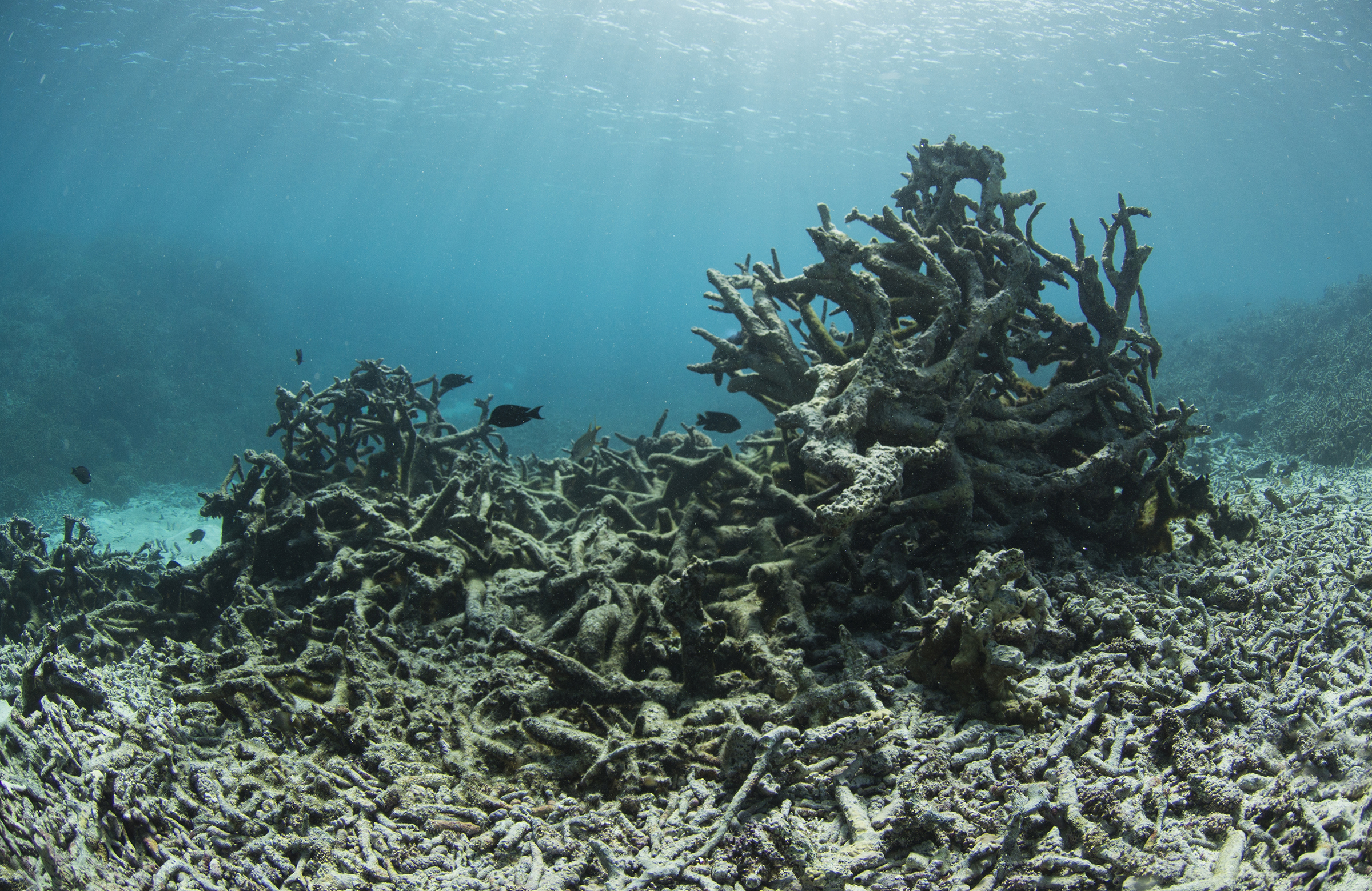Our sunscreen use is killing Coral Reefs, here are some easy and safe ways to change this
 |
| Edward Snijders |
When it comes to compromising with our shopping habits to make them zero waste, sunscreen is certainly not something that anyone would want to take a risk on. Protecting our skin from burning and harmful skin-cancer causing rays is vital. However, traditional sunscreen may not be as good for our health as we think it is.
One of the most common ultraviolet blocking chemicals used in sunscreen is called oxybenzone, which has been proven to be damaging both to marine life and human health. In the US the CDC recently found that 97% of people had the chemical present in their urine, which is alarming as oxybenzone has been linked to endocrine disruption, allergies and reduced fertility. Oxybenzone is also proven to be toxic to coral reefs, causing genetic mutations and deformities as well as inducing bleaching. It is also toxic to other marine life, including fish and marine mammals. Studies have shown that such harm can occur where oxybenzone concentration is as low as 60 parts per trillion; for context, in Hawaii the beaches have an average concentration of 700 parts per trillion. Consequentially, you may have heard on the news recently that, Hawaii has become the first state in the world to pass legislation to ban oxybenzone in sunscreen.
 |
Photo composite of before, during, and after bleaching at Airport Reef, Tutuila, American Samoa. By
|
 |
| From http://www.globalcoralbleaching.org |
How does this toxic chemical travel from our sunscreen into the ocean, though? The simplest answer is that when we swim in the sea it washes off, reefs in places where more humans swim have much higher rates of coral bleaching. However oxybenzone reaches the ocean via other less obvious pathways as well, meaning the sunscreen you apply on dry land can still affect marine life. Studies have found traces of it in urine samples as soon as 30 minutes after application, meaning when the toilet is flushed so is the oxybenzone. Whenever you shower after applying sunscreen you are also washing it into the waterways. Whilst in the UK we have fairly sophisticated water treatment systems, countries in which we holiday may have less-developed sewage systems that lead more directly to the ocean. That being said, even UK water treatment plants may not remove oxybenzone effectively as part of their usual protocol.
Hopefully this post has now convinced you that something has got to change with your sunscreen habit, but I'm sure most people won't want to risk skin cancer from sunburn to do so. As someone who regularly burns on cloudy days in the UK, I can fully empathise with anyone unwilling to go without sunscreen, it's factor 50 all the way for me. Thankfully there are plenty of reef-safe options out there, at reasonable prices, they're just a little bit harder to find. It's important to note that no sunscreen is 100% safe for all marine life, but there are some that are drastically better than others, when looking for more eco-friendly sunscreen, here are a couple of tips I've found:
- Look for reef-safe labels - it's a major selling point for most brands so they're likely to make it obvious
- Wear water-resistant sunscreen - the more water resistant it is, the less it's ingredients will wash off you and into the sea when you're swimming
- Read the ingredients - obviously oxybenzone is the ingredient to avoid, again a lot of brands will advertise that they're oxybenzone-free, other ingredients to avoid are butylparaben, octinoxate, triclosan, PABA, ethylhexylmethoxycinnamate, and 4-methylbenzylidene. Look out for paraben-free sunscreen too. The problem is, of course that a lot of these chemicals have more than one name, so ingredient lists can be a bit of a minefield.
- Look out for Non-nano zinc oxide - this is the main ingredient used in reef-safe sunscreens so it's easier to look out for mineral based sunscreens than to look for ingredients to avoid.
- Shop online - Personally I haven't had much luck looking for ocean friendly sunscreen in high street stores, with the exception of Holland and Barrett, online shops such as ethical superstore are good, though, as well as amazon, where a lot of new smaller businesses start off.
So far I've managed to find three completely zero waste sunscreen products that are readily available in the UK:
Fuka Eri
This is an SPF 50 sunblock that comes in a metal tin - no plastic, yay! It's a mineral sunscreen that uses zinc oxide and is 100% natural. The product itself is kind of a paste and is slightly tinted so acts almost as foundation, it looks pretty dark when you first open it, but it blends in really well and looks natural on my extremely pale skin, while providing a good amount of coverage (I don't know how it would work on black skin though). For me it's the perfect facial sunscreen and does well protecting my sensitive skin, and hasn't brought my skin out with any extra spots. I would only use it on my face though, due to the tint and the fact that it would be too time consuming to apply elsewhere. I'm planning to use it instead of foundation when I go travelling.
It's made in Spain and I purchased mine on amazon for a little under £20.
Shade
I haven't tried this one as it's SPF 25, which definitely would not suffice for my pale skin! It does have good reviews on amazon, however, and is totally natural, made from only 4 organic ingredients. It comes in a metal tin too. £12.60 for 100ml or £3.75 for 15ml - good if you want to test it before forking out for a big one.
All Good Sunscreen Butter
Another one I haven't tried but just came across on amazon while researching this post! It's a natural zinc sunscreen and comes in a metal tin. It's SPF 50 so I'll give it a go when my other sunscreens have run out, as the reviews look good. It's £12.22 for 1oz
While being completely zero waste is obviously the best option, I know for some people applying suncream like a body butter is a bit too weird... we can't have too much change in one go! I definitely want my sunscreen to be easily applicable, especially when travelling solo you need to be able to get those hard to reach places without any help and I've always found sprays to be the easiest way to do this. After spending some time researching online I've found a few that are a bit more traditional, but still reef-friendly.
Alba Botanica
I purchased their SPF 50 clear spray and it's been working well for me. It's very easy to apply and isn't sticky or smelly. It is very water resistant and is also recommended by the skin cancer foundation. The company themselves seem to be really cool, they give back by supporting the Care foundation in empowering and educating girls, their products are all cruelty free and vegetarian, and they make efforts to ensure they are as earth-friendly and sustainable as possible - a company I'm happy to vote with my money for! Though they do sell mineral sunscreen, this particular one isn't zinc based. I did have a bit of a worry after I bought it when I saw that one of the ingredients was octocrylene, as I had read that this was harmful to coral, however this study found that it did not affect coral when tested against a control. The sunscreen itself is marked as reef-safe and fully biodegradable, it definitely doesn't contain any of the main offenders like oxybenzone, and it is packaged with minimal plastic so should be easy to recycle when the time comes. Obviously it's not perfect but it certainly is a much better alternative to normal sunscreen, and definitely lowers my environmental impact.
It's £15.99 on ethical superstore, or £17 on amazon, a bit pricey for sunscreen but for me the convenience and ethics of the product are worth it. They also sell sun lotion if that's more your jam.
Other reef-safe sunscreen that I haven't tried but have found during my searching:
Badger Balm - they're all natural and also do some special baby/kid products, as well as sports sunscreen in a variety of SPFs.
Jason - natural mineral based sunscreens that come in a variety of different formulas and SPFs
Incognito - primarily a natural insect repellent brand, they also do a combination repellent and sunscreen. The brand itself has really great ethics, and their packaging is made from sugarcane plastic.
Babyganics - natural, organic, mineral sunscreen - made for babies but what's to stop adults using it?
Goddess Garden - natural mineral sunscreen
Suntribe - another all natural mineral sunscreen
All of these sunscreens can easily be found on google, have a shop around though if you wanna save money cause they can often be discounted. Hopefully this post has convinced you that we need to change our sunscreen habits, and made it easy for you to do so! Remember that small changes can make a big difference. x
References
https://www.ncbi.nlm.nih.gov/pubmed/29086472
http://www.marinesafe.org/blog/2016/03/18/sunscreen-pollution/
https://www.independent.co.uk/extras/indybest/fashion-beauty/sun-care-tanning/best-eco-friendly-sunscreen-natural-organic-mineral-for-face-baby-sensitive-skin-a8340881.html
http://www.snorkelsandfins.com/reef-safe-sunscreen-brands/
https://www.ncbi.nlm.nih.gov/pmc/articles/PMC2291018/












Comments
Post a Comment